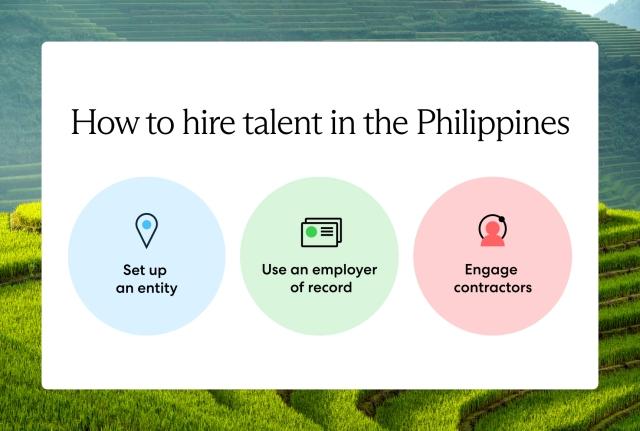Hiring employees in the Philippines has many benefits for companies looking to expand their global workforce.
The Philippines has a significant labor force of about 40.5 million individuals, close to 40% of its total population, and its thriving industries include manufacturing, agribusiness, and the services sector.
The country is also well-known for its outsourcing capabilities, fast-growing economy, and young English-speaking workforce.
Read on to learn how to hire employees in the Philippines from another country and compliantly tap into this growing market.
Can foreign employers hire in the Philippines?
Yes, foreign employers can hire in the Philippines. To hire employees in the Philippines, you must either set up a legal entity in the country or partner with an employer of record (EOR).
Global employers can also engage local contractors instead, but this approach involves significant compliance risks and limits scalability. We discuss this in more detail below.
How to hire employees in the Philippines
The three main options global companies have for hiring in the Philippines are entity establishment, partnering with an EOR, and engaging global contractors.

1. Set up a legal entity in the Philippines
If a company wants to hire someone from the Philippines directly, it must first establish a legal entity in the country.
Entity establishment is the traditional route many businesses take for building an overseas presence. It allows you to engage local talent directly and simplifies the hiring process. It also provides a strategic route to establishing a long-term presence in the target market.
Entity establishment is a beneficial option if you hold fixed assets in the country, have a substantial budget to spend, or are planning to hire a large number of employees in the Philippines.
Still, entity establishment is costly and time-consuming. It requires a knowledgeable HR team with expertise in local tax and labor regulations, a sizable initial capital investment, and compliance with ongoing entity maintenance fees.
You should only pursue entity establishment in the Philippines if it fits your long-term global expansion goals.
2. Partner with an employer of record in the Philippines
An employer of record (EOR) is a legal entity equipped to hire, pay, and manage supported employees in global markets on your behalf, including in the Philippines, without establishing a legal entity.
Acting as your global HR team, an EOR handles everything from hiring and onboarding to risk mitigation, global benefits administration, running global payroll, and providing ongoing HR support so you can quickly and compliantly hire and pay employees in the Philippines without establishing an entity.
While an EOR takes care of the heaviest HR tasks associated with building a distributed workforce abroad, you continue owning your employees' day-to-day responsibilities and goals.
Partnering with an EOR is a streamlined option to test foreign markets and set up your workforce quickly in multiple countries with less financial commitment and risk.
Learn more: What Is an Employer of Record (EOR)?
3. Hire and pay contractors in the Philippines
Rather than hiring full-time employees, some companies choose to engage Filipino contractors instead. Engaging contractors allows employers to target local talent with specialized skills needed for a specific project or on a sporadic basis.
Because a contractor provides their services as a self-employed individual, there is no commitment beyond the contract term. Hiring and paying contractors also results in more flexibility, quicker onboarding times, and cost savings.
However, engaging Filipino contractors poses misclassification risks. If you classify a worker as a contractor but treat them like an employee, you risk back taxes, benefits arrears, reputational damage, and other penalties. We cover misclassification risk in more detail in a later section of this article.
Learn more: Should You Hire a Contractor or Full-Time Employee?
How to hire Filipino workers directly
To hire employees in the Philippines directly, foreign companies must first establish a local entity—a reasonable option if you anticipate a long-term presence in the country.
However, an alternative to hiring Filipino workers directly is to engage local contractors, a flexible, low-commitment, and cost-effective solution that entails scalability limitations and misclassification risk.
How much does it cost to hire an employee in the Philippines?
The cost of hiring an employee in the Philippines includes the employee’s total base salary plus a minimum of 13.5% of that salary since employers must make contributions of 9.5% to the Social Security System (SSS), 2% to the Philippine Health Insurance Corporation (PhilHealth), and 2% to the Home Development Mutual Fund.
Employers must also pay their Filipino employees a 13th-month payment, which is equal to 8.33% of their employees’ annual base salary.
Interested in hiring employees in the Philippines? Use our employee cost calculator below to get reliable insights into employee costs and payroll contributions in the Philippines:
How to pay an employee in the Philippines
To pay employees in the Philippines, foreign employers can run payroll internally or outsource it to a third party. If employers manage payroll internally, they must make accurate deductions and contributions, follow local payroll regulations, and make payments to employees via bank transfer or paycheck on a local account.
Many employers choose to outsource payroll in the Philippines to a global payroll outsourcing partner to lighten their workload and mitigate compliance risks.
When paying international contractors in the Philippines, most companies use international bank transfers, online money transfer companies, international money orders, or a contractor payment platform.
Compliance risks when hiring in the Philippines
While global companies can hire and pay Filipino employees from abroad, compliance risks always arise when engaging talent across international borders.
The risks involve payroll tax regulations, permanent establishment liability, statutory benefits requirements, and misclassification. We discuss each of these in detail below.
Incorrect payroll contributions
A foreign employer may be unfamiliar with mandatory payroll contributions in the Philippines. Failure to correctly calculate payroll and taxes in the Philippines leads to litigation and fines, so it’s essential to understand the requirements.
In the Philippines, an employer must factor in the following payroll contributions for their employees:
- Social Security System (SSS). The SSS provides financial support for various contingencies, such as sickness, maternity, disability, retirement, and unemployment.
- Philippine Health Insurance Corporation (PhilHealth). PhilHealth is a government-funded healthcare system.
- Home Development Mutual Fund. This housing program provides short-term loans and access to housing programs for all Filipino workers.
Permanent establishment
When a company has a fixed location in the Philippines and generates revenue in the country, this usually triggers permanent establishment, subjecting you to local corporate taxation.
If you establish a local entity in the Philippines, your local corporate tax liability is clear. However, if you engage Filipino contractors or send domestic employees to the Philippines on business trips, these circumstances can also trigger permanent establishment.
For instance, if local contractors close deals or make sales in the Philippines on your company’s behalf, this can trigger permanent establishment, creating a local tax liability. Overlooking this liability subjects you to noncompliance penalties like tax arrears, fines, and time-consuming litigation.
Statutory benefits
Filipino employees are also entitled to various statutory benefits and holidays that may be new to a foreign employer, such as:
- National regular holidays. The number of national regular holidays varies from year to year. In 2024, there will be 10 national regular holidays.
- Special non-working days. The Filipino government prescribes eight to 10 special non-working days per year. In 2024, there are eight.
- Service discretionary leave. This is similar to paid time off in other countries.
- Personal Equity and Retirement Account (PERA). PERA is a retirement fund similar to the U.S. 401K retirement plan.
- 13th-month pay. Unlike a bonus, 13th-month pay is non-negotiable and is typically equivalent to one month’s pay or one-twelfth of the employee’s annual salary. Employers must pay it out by December 24 each year.
Global companies that hire employees in the Phillippines must be ready to offer their Filipino team all of the local statutory benefits.
Learn more about labor laws and regulations in the Philippines.
Misclassification risk
When a company engages contractors, misclassification is a risk, even if unintentional.
For example, suppose you treat a contractor like an employee by managing their work schedule or paying them a fixed salary. In that case, local authorities will deem them an employee under local labor regulations, subjecting you to benefits arrears, back taxes, and fines.
Each country has its own employee and contractor definitions, so it’s crucial to consider the classification and reporting requirements for both your home country and the Philippines.
Consider U.S. companies: If a U.S. company engages a Filipino contractor, it must submit a W-8BEN tax form to the IRS to classify its foreign worker’s status as a non-U.S. citizen and determine proper tax reporting and withholdings.
Failure to properly classify your foreign contractor in the Philippines or meet local reporting requirements can result in potential penalties for your company, including fines, reputational damage, and forced market exit.
Read our complete guide to employee and contractor misclassification.
Hire in the Philippines quickly and compliantly with Velocity Global
Hiring employees in the Philippines is possible when done compliantly. Simplify compliance by working with an experienced partner like Velocity Global.
Velocity Global’s EOR solution makes it easy for global companies to hire and pay employees in 185+ countries worldwide, including the Philippines, from anywhere—without having to set up legal entities.
Backed by a knowledgeable team and a suite of employment solutions, we handle everything from hiring, onboarding, relocation, and immigration to global benefits administration and global payroll while offering ongoing HR support to your distributed workforce in the Philippines.
With Velocity Global at your side, you can easily own your team’s day-to-day tasks as you source top talent and build your dream team in the Philippines and beyond.
Ready to start quickly and compliantly hiring employees in the Philippines? Contact us today to get started.



